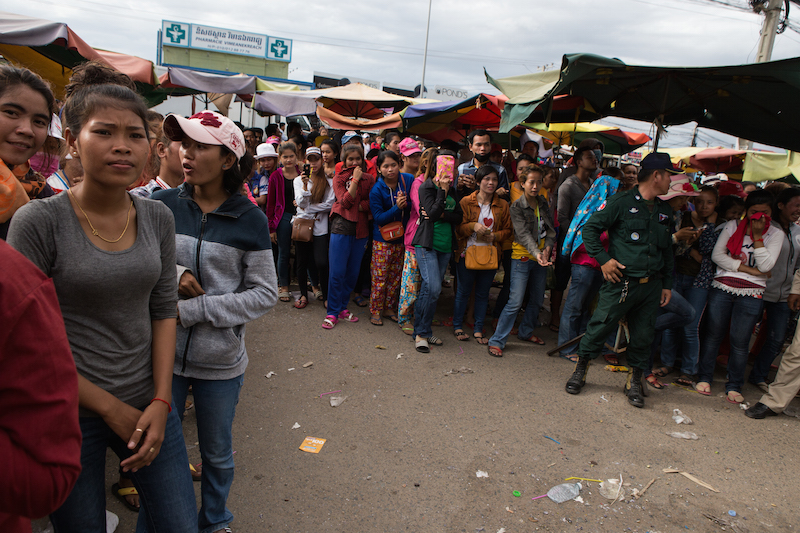Nearly 2,000 garment workers on Wednesday extended a strike over paid time off for Sunday’s elections after their employer suspended 10 union activists at the factory, they said.
The strike started when the Southland factory in Phnom Penh’s outer Pur Senchey district denied on Friday morning the workers’ demand to receive two paid days off without using their annual leave to enable them to travel to their hometowns to vote in the commune elections, said Seang Vichet, one of the workers who has been suspended.

In the weeks leading up to the vote, labor rights groups had advocated for factories to give workers from far-flung provinces the Saturday and Monday off to give them ample travel time, though the government was less specific in its stance.
Mr. Vichet said that following the initial rejection, the workers asked that the company deduct one day of annual leave and 50 percent of one day’s salary.
Despite the request being ignored, they had planned to go back to work on Wednesday morning until they saw an official court notice on the gates about the suspensions, he said. Some strikers who had already entered the compound gates were locked inside by guards for hours, he added.
In the notice, Phnom Penh Municipal Court Judge Heng Sokna urged “all the workers of Southland company to return to work as regular to their duties within 48 hours except 10 workers that have been banned from returning to work.”
The judge wrote that he was responding to a complaint filed by the company’s lawyers.
Judge Sokna also said he had learned that the workers began the strike “without informing or submitting any documents about the strike in advance, as written in Article 324 of the Labor Law.”
Mr. Vichet, who is a member of the Collective Union of Movement of Workers (CUMW), said about 100 workers were back at work on Wednesday, but that most of the nearly 2,000 workers remained on strike.
When reporters visited the factory at about 4 p.m., a crowd of strikers who had gathered outside the gates booed and heckled those returning workers as they left the compound, while Choam Chao commune police stood by.
District officer Seth Kimseng said that 30 officers had been deployed throughout the day to maintain security at the factory, which produces apparel for international brands such as Polo, Next and American Eagle.
Preap Munysovann, an official at CUMW, said the factory had discriminated against the union’s members by targeting and subsequently suspending them, without evidence that the activists had led the strike. Most of the other workers at Southland belonged to a government-aligned union, the Cambodian Union Federation, he said.
CUMW president Pav Sina echoed these sentiments in a statement on Wednesday, adding that “the activities of the company have completely abused labor law and the [International Labor Organization] treaty.”
Ken Loo, secretary-general of the Garment Manufacturers Association in Cambodia, said that he did not know the legal basis for the suspensions but that the Labor Ministry was already involved.
“I’m sure they will be able to advise on the suspension, if it’s legal or not.”
The strike, however, was illegal, he said, as the workers had not given their employer seven days’ notice.
Moeun Tola, executive director of labor rights organization Central, said that only the courts could determine whether the strike was illegal, while only the Labor Ministry could determine the legality of the suspensions.
Labor Ministry spokesman Heng Sour could not be reached.
Mr. Tola said it was “quite common” for workers to become targets when they attempt to form independent unions, though it was often hard to prove.
“We need to document strongly to prove that the management is discriminating against them,” he said.
Esther Germans, program manager for Better Factories Cambodia (BFC), an International Labor Organization project aimed at improving working conditions, said that BFC had not found evidence of Southland’s management interfering with union membership, though she agreed it was a difficult area to monitor.
“I…have to note that violations on freedom of association are sometimes hard to prove during an assessment process, as this is a sensitive issue that can sometimes be hidden,” she said in an email.
She said BFC had received a letter from CUMW regarding their members, and would “look into the issue during our next assessment.”
Representatives for Southland could not be reached.
Correction: An earlier version of this article misspelled the names of Phnom Penh Municipal Court Judge Heng Sokna and CUMW official Preap Munysovann.



